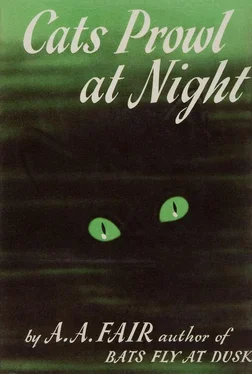“Great Scott!” Belder exclaimed, as he stared down at the memorandum on the desk.
Bertha Cool smiled at him with calm assurance. “Hits you with something of a jolt, doesn’t it? Finding out that you’ve had a little twerp in your office who—”
“It isn’t that,” Belder interrupted. “It’s what you said about the Remington portable.”
“What about it?” Bertha asked.
“That’s my wife’s machine.”
The door from the outer office opened. Carlotta Goldring, her prominent blue eyes taking in everything and everybody in the room, said, “There was no one in the reception-room, so I came on in. I hope I’m not—”
No one paid any attention to her. Bertha Cool pointed her finger at Imogene. “Look at her. You can tell I’ve called the turn. The twerp may have managed to write these letters on your wife’s machine at your house, but she wrote those letters! She—”
“It’s a lie!” Imogene screamed. “And what’s more, the portable I have at home isn’t a Remington. It’s a Corona!”
Carlotta, wide-eyed, moved around to the edge of the room, stopped near the fireplace, her back to the fire, regarding the scene with speechless amazement.
“Try to deny that you’re in love with your boss,” Bertha accused. “Try to deny that you thought if you could only get rid of his wife, you’d have easy sailing; that you wrote these letters—”
“Wait a minute,” Belder interrupted. “She couldn’t have done it, Mrs. Cool. She wrote that memo one day when I had my wife’s machine at the office — taking it home after an overhaul. Imogene tried it out. I remember the whole thing very clearly now.”
“Then she wrote both letters that same day,” Bertha charged.
“She couldn’t have. That was before either of these women — before Dolly entered the picture.”
Sellers said to Belder, “Who else had access to this typewriter?”
“Why — no one, I guess. My wife’s family—”
Sellers’ eyes were narrowed and hard. “And the maid, of course.”
“Sally?”
“Yes. Who else would I be talking about?”
Belder said, “Why — yes — but why should Sally have written a letter to my wife suggesting that she was playing around with me? It’s cock-eyed. It’s crazy.”
“But Sally could have had access to that machine,” Sellers insisted.
“She could have, yes.”
Imogene Dearborne slumped down in a chair, her handkerchief at her eyes. The sound of her sobs filled the room whenever there was a lull in the conversation.
Sellers said to Bertha Cool, “You may be right. You may not be right. There’s something screwy about this whole business... Belder, get up and quit stalling around. Put this chair in just about the same position it was when Dolly Cornish was sitting in it... Okay, it was sitting in that position. All right — now let me sit there. Let me see what’s visible through the window from this angle.”
Sergeant Sellers moved his body back and forth enlarging the angle of his vision as far as possible.
“Imogene, cut out that damn bawling, take your pencil and make a note of these places: Dr. Cawlburn, physician and surgeon... Dr. Elwood Z. Champlin, dentist... The dentist looks the most promising. We’ll take a chance on him first; dental chairs always face the windows. I can look across and see a patient in that chair right now. Get those telephone numbers for me, Imogene... Come on, snap out of it!”
Imogene might not have heard him. She sat in the chair sobbing.
Sergeant Sellers got up out of his chair, reached across, grabbed her shoulder, gave it a quick shake, said, “Snap out of it. Do your bawling after office hours. I’m working on a murder case. Get out there and look up those numbers.”
Imogene glanced up at him and, at the expression on his face, suddenly got to her feet, crossed to Belder’s desk, picked up a telephone directory and began looking up numbers, dabbing at her eyes with a handkerchief from time to time.
Belder handed her a pencil and a memo pad. He patted her arm awkwardly. “There, there, Miss Dearborne,” he said. “Don’t feel that way about it.”
She jerked her arm away from his touch, wrote out the telephone numbers, tore the sheet off the memo pad, and handed it to Sergeant Sellers.
Sellers picked up the telephone, dialled a number, said, “This is Sergeant Sellers of Police Headquarters. I want to talk with Dr. Elwood Champlin, personally... Okay, put him on... Police Headquarters. Tell him it’s important...” While he was waiting, Sellers picked up the cigar which he had deposited on the desk, puffed it into renewed activity, and held it tilted at an aggressive upward angle. Abruptly he removed it, said into the mouthpiece, “Hello, this Dr. Champlin?... That’s right. Yes, Sergeant Sellers from Police Headquarters. Look at your appointment book and tell me what patients you had in the chair in your office last Monday between two o’clock and three-fifteen... No, just the names of the patients... All right, what’s the next name? H-a-r-w-o-o-d. All right, I’ve got that. Who’s next?”
A slow grin came over Sergeant Sellers’ face. “Miss or Mrs?” he asked.
“I see. All right, thank you very much, Doctor. I’ll get in touch with you later on... Yes, that’s all I wanted to know.”
Sellers dropped the receiver back into place and grinned at Bertha Cool.
“The second patient in Dr. Champlin’s office,” he said, “from two-fifteen to two-forty-five was a Miss Sally Brentner.”
Elsie Brand looked up from her typewriter as Bertha Cool entered the office.
“I’ll bet you forgot all about having a ten-thirty appointment with George K. Nunnely,” she said.
“I did for a fact,” Bertha admitted. “Was he in?”
“He not only was in, but he paced the floor and kept biting his upper lip. He was definitely nervous and annoyed.”
Bertha Cool flopped down in a chair, said, “Well, that’s what comes of fraternizing with cops. That damned detective barged in on me before breakfast this morning, made me feed him, and then dragged me around as though I’d been an assistant coroner or something... Hell of a note when I can’t take care of my own business. That’s important, too — a chance to clean up a little dough... Was he sore when he left?”
“I don’t know. He was certainly worried. He used the telephone twice while he was here.”
“Didn’t find out what number he was calling, did you?”
“No. He had me connect him with an outside line, and then dialled the number himself.”
“Leave any message?”
“He wanted you to call his office just as soon as you came in.”
Bertha grinned. “Gone a long ways from the poker-faced high-and-mighty big-shot that slammed up the phone in my ear, hasn’t he?”
“Personally, I think he’s almost crazy with worry,” Elsie said. “Who was the detective who called on you, Sergeant Sellers?”
“Uh huh.”
“I think he’s nice.”
“He’s all right if you like flatfeet,” Bertha said wearily. “I don’t. I just wish they’d leave me alone. They get delusions of grandeur. The way he busts in and orders me around! The hell with him.”
“What was it all about?” Elsie Brand asked.
“Looks as though Mrs. Belder has committed a murder.”
Elsie Brand’s eyes widened.
Bertha said, “It could have been an accident, but the cops don’t think so — and I don’t think so.”
“Who was the victim?”
“Sally Brentner, the maid in the house.”
“Any motive?”
“Jealousy.”
“Her husband?”
“A poison-pen letter indicated her husband was playing around with Sally and that Sally was staying on the job simply to be near him. And the hell of it is, Sally must have written that letter herself.”
Читать дальше











